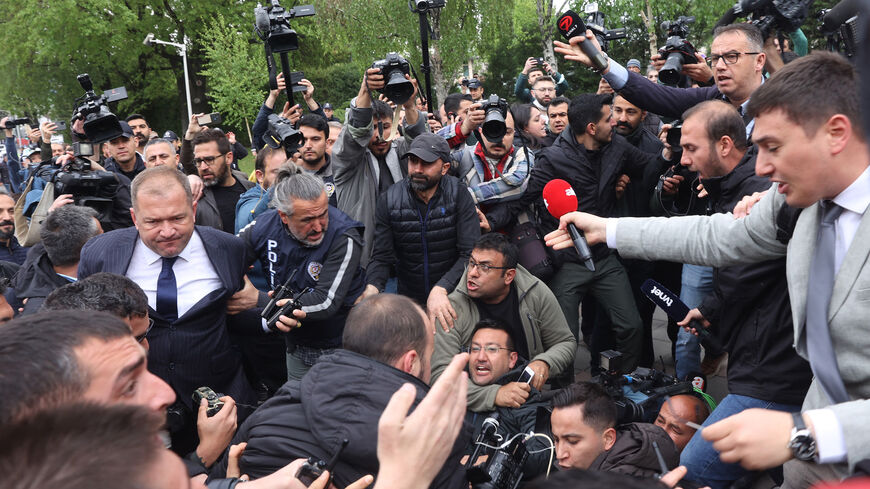« Government opponents fear Ankara will use all of its means to stifle unfavorable news and public debate ahead of crucial elections next year » reports Sibel Hurtas in Al-Monitor.
Turkey’s independent media – already dwindled and largely muted – finds itself under a tightening siege as the country heads for crucial elections next year. Pressure is rising on newsrooms in various forms, from broadcasting bans and financial penalties to judicial probes and new legal threats, including jail terms for spreading “untrue” information.
On Oct. 25, 11 reporters from two Kurdish news agencies were detained in police raids on their homes and offices in several cities, reportedly on suspicion of links to armed Kurdish militants. Balaclava-clad officers armed with long-barreled guns led the raids, according to a video clip the police posted on social media, drawing protests from media organizations. Sixteen reporters from the same agencies were arrested in June.
Last week, the broadcasting watchdog RTUK slapped a three-day broadcasting ban on the Tele1 TV channel over remarks an opposition lawmaker made on air. It is the second such penalty Tele1 has received within a year, which, under the law, leaves it at risk of losing its license. The lawmaker had criticized the Religious Affairs Directorate, saying it has become “a tool of political Islam.”
The members of the watchdog are nominated by parties represented in parliament. The nominees of the ruling party and its nationalist ally hold the majority.
In 2021, RTUK imposed 71 penalties, including hefty fines, on broadcasters – all over critical programs. The content of pro-government channels was not discussed even once, according to Ilhan Tasci, one of the two RTUK members nominated by the main opposition.
The government sees the upcoming elections as an “existential” matter, so “it will try to muffle critical broadcasters as much as it can,” Tasci told Al-Monitor, adding that attempts to take some broadcasters off the air would not come as a surprise.
The presidential and parliamentary vote, due in June at the latest, looms as the toughest challenge yet for President Recep Tayyip Erdogan and his Justice and Development Party, in power since 2002. Their popular support has sagged amid galloping inflation and rampant allegations of corruption and nepotism.
Tele1 received some reprieve Oct. 26 as an Ankara court suspended the three-day ban upon a petition by the channel. The court will make its final decision after hearing the two parties.
A day after Tele1 was penalized, the Press Advertising Agency — the body that regulates state advertising and is thus able to impact the revenues of media outlets — rejected the appeal of the daily Evrensel against a 2019 decision to ban the paper from receiving public ads for alleged breaches of the rules.
Evrensel’s Ankara representative Birkan Bulut said the daily’s right to state advertising was “usurped” because of its critical coverage. The penalty, he added, was based on “inconceivable” reasons, including that some entities purchased the paper in bulk for their members and that some individuals bought more than one copy of the same issue from the kiosks. “Moreover, they rejected our appeal on the grounds that we don’t meet the daily circulation criterion of at least 4,000 copies, which is not true,” Bulut told Al-Monitor. “The penalty has left us in serious financial hardship, but we’ll overcome these efforts to strangle us with the support of our readers.”
Along with journalists, social media users are now in the crosshairs after fresh restrictions took effect last week. The amendments mandate jail terms of one to three years for those who “spread untrue information about the country’s internal and external security and public order and health.” The sentence can be increased if the offense is committed by an anonymous user.
Tasci foresees no letup in such pressures as the polls near. “It’s not hard to predict that the government will use RTUK and any other institution to hamper the public’s right to news and information,” he said.
Al-Monitor, October 26, 2022, Sibel Hurtas, Photo/Adem Altan/AFP

